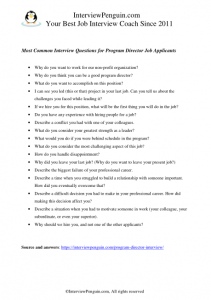Job that offers a lot, and requires a lot. Program director is an interesting occupation, typical for non-profit sector of economy (nearly the same position is called “project manager” in for-profit sphere), but you can find the job title also in for-profit corporations specializing in delivering services rather than products.
You will respond for planning, budgeting, staffing, organizing, and controlling the program(s), regardless of your place of work–be it a university, a small radio station, a religious organization, a charity, some public agency, or a big corporation.
While interviewing for this job it is crucial to show right attitude to work, and understanding of the goals of the organization, and what they try to achieve with the program(s). Demonstrating excellent communication and leadership skills goes without saying. Let’s have a look at the questions they will ask you in the interviews.
Table of Contents
Why do you want to work for our organization,and not for someone else?
Praise them for something. It can be their reputation, excellent employment conditions, a leading service they offer to their clients, or some worthy cause they follow with their work (the last one is easy to do in non-profit, but will be harder when you apply for a program director job in a for-profit setting).
They should get an impression that they are your first choice, and that you have some positive associations with their organization, or with their brand.
Another option is referring to their field of business. If you’ve worked in banking for ten years and the position of a program director is in a bank, it makes perfect sense to choose them over a company from a different field, though the other one may offer a better salary. Referring to their specialization or specific field of business will never harm your chances to succeed.
Third option is personal recommendation. Connections play a big role in the corporate sphere. If you know someone in the company, perhaps an excellent manager or executive, and they recommended you the place, you should definitely point it out.
Why do you think you can be a good program director?
Experience is priceless in this case. Talk about similar programs or projects you led in the past.
Big scale, small scale–doesn’t matter. If you took care of planning, budgeting, hiring staff, and overseeing a project, it will help you greatly in this interview.
Results you achieved before, and references from your past employers or clients, will easily convince the hiring managers that you can be the right guy to lead their program.
But what to do, if you have no experience? Well, you have to play with the cards you’ve been dealt. Talk about your understanding of their program, your education, skills and abilities that make from you a good applicant for the position. This may not be enough to succeed, but you do not have other options for your answer once you lack previous experience.
What do you want to accomplish on this position? What goals will you set for yourself?
First and foremost, you have to understand what the organization tries to achieve with their activity—the reason why they exist.
It can be saving lives in a non-profit, or following some other worthy goal. In education, they typically try to prepare the students for professional career in this or that field.
In a radio station it can be a lot of things, depending on the type of station, and whether they are commercial or public. In any case, find out why they exist, what they try to achieve in general.
Second step is understanding how it translates to a job of a program director, and how the organization fares at the moment.
Maybe they are not getting enough applications from students (when you apply for a program director job at school). Or nobody really listens to their station, or the numbers aren’t as good as they’d like them to be (when you apply for a program director job in a radio station). Or, they just do not have enough programs in place, and hence miss on a huge chunk of prospects for their service (when you apply in some corporation).
Of course, the problems can be more specific (for example related to staffing needs), and your new employer can actually be thriving, and the only reason why they need a program director is that they are growing rapidly, and the CEO cannot supervise the program managers any longer. Hence they need a new force in the organization—a new program director.
Needless to say, you need to research about the organization to understand these things. If you fail to get a good grasp of it, however, for whatever reason, you can say that you simply want to help them reach their goals, and will set your goals accordingly, as soon as you understand where they are standing with their programs at the moment. It is not the best answer, but it is a safe bet, ensuring that you won’t say something stupid, for example setting a goal that they’ve already achieved…
I can see you led (this or that) project in your last job. Can you tell us about the challenges you faced while leading it?
They are testing your attitude with this question. Each program or project has some challenges. Speak about them openly, and admit making mistakes–and learning from them.
The question is not whether we can lead a program without facing challenges, or making a single mistake–since that’s impossible. Good leaders are able to address the challenges, and overcome them.
To typical challenges we face when leading a program belong: problems with finding (good) volunteers or workers, problems with funding, failing to achieve one of the partial milestones, conflicts in the team, failing to meet deadlines, etc.
Special Tip: To know how to answer a questions, and to actually come up with a great answer on a big day, when facing a panel of interviewers, are two different things. Check my eBook, Program Director Interview Guide, to see multiple great answers to 25 questions you may realistically face in this interview. Get access to materials your competitors won’t see, and outclass them with fantastic interview answers. Thank you for checking it out!
Tell us about a time when you struggled to build relationship with someone important.
Relationships matter everywhere—in our personal life, in business, at work. Interviewers try to see if you can build a good connection with your superiors, your subordinates, and the stakeholders in general, simply someone “important”, whatever the expression may indicate in the context of your interview.
It is especially important to have this ability in a role of a Program Director in a smaller organization, because without having good relationship with the managers from other departments, you will struggle to move your ideas forward, and to get the feedback you need for your work.
Anyway, you should speak about the situation with a good outcome, and you should stress that you took the initiative.
If this is your first job application (or relationship building did not play any role in your last job), you can talk about building relationship with your teacher, principal, or other person who played an important role in your education or private life.
Do you have any experience with hiring people for a job?
Easy question when one has experience. In such a case, you should simply describe a positive experience with hiring your colleagues, people who stayed with the company, people who did a good job. No reason to mention a bad experience in this case.
And if you do not have any experience with hiring people, say that you plan to consult other people in the organization, asking them to help you with the interview template, and also to participate in the interviews.
Show them that you are a team player, and humble enough to ask for help when you need it.
Describe a situation when you were able to use persuasion to convince someone.
Man is a creature of habits, and we do not change easily. The older we get, the more stubborn we are–let’s face the reality. When you work as a manager or director, however, or have any position in sales, the skill to use persuasion to convince other people becomes critical for your professional success.
Persuasion does not happen only in the workplace, however. You want to go see movies and dance, but your boyfriend is tired and wants to spend the Friday evening on the couch. Can you persuade them to agree with your plan? And what techniques will you use?
Or your kids want to take this or that direction in life, inspired by their role models from TV, or friends from school. But you hope for a better future for them, perhaps a Degree, great employment, some safety net. Can you sell them your ideas?
Interviewers are interested mostly in your attitude, and your skills. The situation itself isn’t that important in their eyes. The key is to demonstrate your ability to use persuasion to convince the others. Be it in work, school, family…
Other questions you may face in your program director interview:
- Tell us about a time when you demonstrated leadership at work.
- Describe an obstacle you overcame in your career.
- How well do you adapt to new situations?
- In your opinion, what role should a program director play in interactions with program participants?
- Tell me about a time you had to comply with a policy or procedure that you did not agree with.
- Why did you leave your last job? (Why do you want to leave your present job?)
- Have you ever worked on a project that was a failure?
- Describe the best project you’ve ever worked on.
- Tell me one thing about yourself you wouldn’t want me to know.
- Please describe a situation in which you were a Manager, a Leader and a Boss.
- …..
Conclusion, great answers to all questions
Program director is an amazing job. You can find true fulfillment in this work, and grow both as a leader, and as a human being. But it is in no way an easy job, or an easy interview… Prepare for the behavioral questions. Show the right attitude, and explain how your past experience helped you to get ready fort this role.
And if you are not sure how to answer the questions, or interview for a job tomorrow and do not have much time to get ready, have a look at my eBook, the Program Director Interview Guide. Multiple great answers to all difficult questions you may face in your interview will help you to stand out, impress the interviewing panel, and walk away with a new employment agreement.
Thank you for checking it out, I wish you good luck!
Matthew Chulaw, Your personal interview coach
* You can also download the list of questions in a one-page long .PDF, print it if you want, and practice your interview answers anytime later, even when offline:

May also interest you:
- Leadership interview questions – An essential skill for every good manager, your leadership skills will be tested in an interview for virtually any managerial job. Are you ready to demonstrate them in an interview?
- Project Manager Interview – One of the most exciting jobs you can have, and one of the toughest to get in a job interview…
- Program Manager interview questions.


